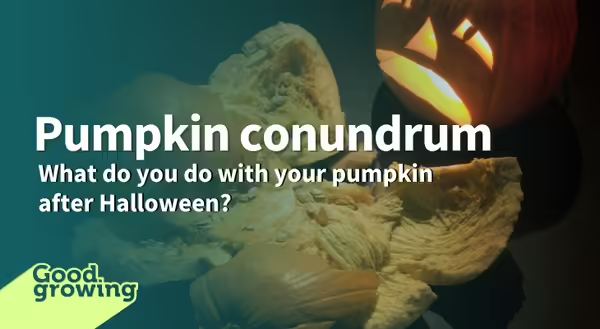
On November 4 several Illinois Extension offices will be offering pumpkin smashes with local partners in communities across the state. A pumpkin smash gives a community an option to turn their spooky Jack-o’-lanterns into compost. In western Illinois, the nearest pumpkin smash will be in Macomb at Veterans Park in partnership with the Macomb Park District. Learn more at go.illinois.edu/PumpkinSmash.
After promoting this event I have encountered lots of excited people looking forward to bringing their pumpkins to our event to smash them using bats, sledgehammers, and even a catapult. Really the sky is the limit on how you want to destroy your pumpkin. However, I have gotten pushback from a few others asking, “Why should I bring my pumpkin to this event? Can’t I just toss it in the trash or in the ditch for animals to eat?”
Well, that certainly is the easiest way to go about disposing of your pumpkin, but not the best. The following is why a pumpkin smash is a great option for disposing of pumpkins:
Millions of Illinoisans need to dispose of millions of pumpkins. A lot of people in Illinois decorate their homes with pumpkins for the Halloween holiday. Even though many people toss these festive yet mushy winter squash into the trash, this adds an immense amount of organic material into the landfill. Typically, in a landfill, this material gets buried and rots in an environment devoid of oxygen, which creates the potent greenhouse gas methane. Keep in mind the landfill must deal with this combustible gas plus, our landfills won’t last forever. Anything we can divert is beneficial.
Dumping pumpkins has become a big problem in parks and other public and private natural areas. First, this would be considered littering and certainly something illegal, especially for a nature preserve. It is all too common for natural areas to become a dumping spot for yard waste, including pumpkins and straw. The thought is these items will compost, but this is not true composting. The straw and pumpkins not only smother plants but take a long time to decompose and it’s often dumped right on the road, so parks must spend money and time for staff to get it picked up.
Most wild animals won’t eat a rotten pumpkin. Lots of different animals will eat pumpkins. Like humans, the critters may be a bit choosy and go for the fresher pumpkin. Furthermore, feeding the animals can create problems. Leaving pumpkins in ditches can draw animals close to vehicles. Many municipalities are actively trying to manage out-of-control wildlife populations, such as white-tailed deer. Laying out a buffet can have consequences.
Pumpkin smashes divert waste from the landfill. Those pumpkins that get smashed, will be sent to a commercial composting facility that supplies compost to homeowners, landscapers, and farmers. While it may be easy to toss your pumpkin in the trash, we promise to offer you a smashing good time on November 4, 10 a.m. to 2 p.m. at Veterans Park in Macomb, Illinois.
Good Growing Tip of the Week: Is Macomb too far away? Check out SCARCE.org for other pumpkin smashes around Illinois. Pumpkins can also be incorporated into a backyard compost pile or dropped off at a municipal or commercial composting facility. Whatever option you choose, avoid tossing fall décor in natural areas, and have a Happy Halloween!
Sign up for our emails! Want to get notified when new Good Growing posts are available? SIGN ME UP
MEET THE AUTHOR
Chris Enroth is a horticulture educator with University of Illinois Extension, serving Henderson, McDonough, Knox, and Warren counties since 2012. Chris provides horticulture programming with an emphasis on the home gardener, landscape maintenance personnel, and commercial landscapers. Additional responsibilities include coordinating local county Master Gardener and Master Naturalist volunteers - providing their training, continuing education, advanced training, seasonal events, and organizing community outreach programs for horticulture and conservation assistance/education. In his spare time, Chris enjoys the outdoors, lounging in the garden among the flowers (weeds to most).